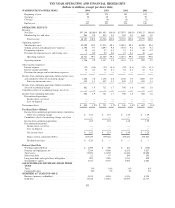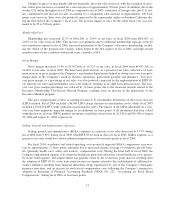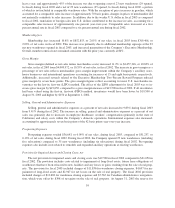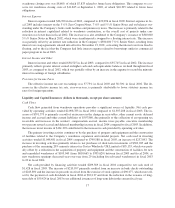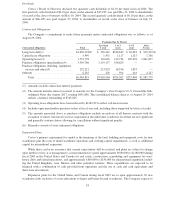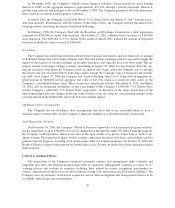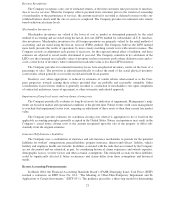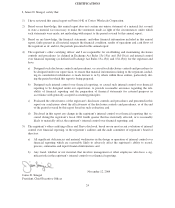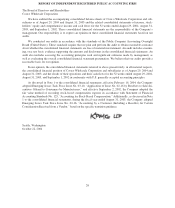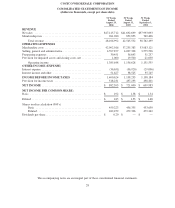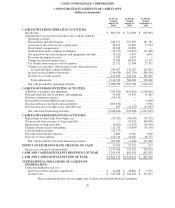Costco 2004 Annual Report Download - page 22
Download and view the complete annual report
Please find page 22 of the 2004 Costco annual report below. You can navigate through the pages in the report by either clicking on the pages listed below, or by using the keyword search tool below to find specific information within the annual report.In November 2002, the Company’s wholly-owned Japanese subsidiary issued promissory notes bearing
interest at 0.88% in the aggregate amount of approximately $27,432, through a private placement. Interest is
payable semi-annually and principal is due on November 7, 2009. The Company guarantees all of the promissory
notes issued by its wholly-owned Japanese subsidiary.
In March 2002, the Company issued $300,000 of 5
1
⁄
2
% Senior Notes due March 15, 2007. Interest is pay-
able semi-annually. Simultaneous with the issuance of the Senior Notes, the Company entered into interest rate
swap agreements converting the interest from fixed to floating.
In February 1996, the Company filed with the Securities and Exchange Commission a shelf registration
statement for $500,000 of senior debt securities. On October 23, 2001, additional debt securities of $100,000
were registered. The $300,000 of 5
1
⁄
2
% Senior Notes issued in March 2002 reduced the amount of registered
securities available for future issuance to $300,000.
Derivatives
The Company has limited involvement with derivative financial instruments and uses them only to manage
well-defined interest rate and foreign exchange risks. Forward foreign exchange contracts are used to hedge the
impact of fluctuations of foreign exchange on inventory purchases and typically have very short terms. The ag-
gregate amount of foreign exchange contracts outstanding at August 29, 2004 was not material. The only sig-
nificant derivative instruments the Company holds are interest rate swaps, which the Company uses to manage
the interest rate risk associated with its borrowings and to manage the Company’s mix of fixed-rate and variable-
rate debt. As of August 29, 2004, the Company had “fixed-to-floating” interest rate swaps with an aggregate no-
tional amount of $600,000 and an aggregate fair value of $25,754, which is recorded in other assets on the
Company’s consolidated balance sheet. These swaps were entered into effective November 13, 2001, and March
25, 2002, and are designated and qualify as fair value hedges of the Company’s $300,000 7
1
⁄
8
% Senior Notes
and the Company’s $300,000 5
1
⁄
2
% Senior Notes, respectively. As the terms of the swaps match those of the
underlying hedged debt, the changes in the fair value of these swaps are offset by corresponding changes in the
carrying amount of the hedged debt and result in no net earnings impact.
Off-Balance Sheet Arrangements
The Company has no off-balance sheet arrangements that have had or are reasonably likely to have a
material current or future effect on the Company’s financial condition or consolidated financial statements.
Stock Repurchase Program
On November 30, 2001, the Company’s Board of Directors approved a stock repurchase program, authoriz-
ing the repurchase of up to $500,000 of Costco Common Stock through November 30, 2004. Under the program,
the Company could repurchase shares at any time in the open market or in private transactions as market con-
ditions warrant. The repurchased shares would constitute authorized, but non-issued shares and would be used for
general corporate purposes, including stock option grants under stock option programs. On October 25, 2004, the
Board of Directors renewed the program for another three years. To date, no shares have been repurchased under
either program.
Critical Accounting Policies
The preparation of the Company’s financial statements requires that management make estimates and
judgments that affect the financial position and results of operations. Management continues to review its ac-
counting policies and evaluate its estimates, including those related to revenue recognition, merchandise in-
ventory, impairment of long-lived assets and warehouse closing costs and insurance/self-insurance liabilities. The
Company bases its estimates on historical experience and on other assumptions that management believes to be
reasonable under the present circumstances.
20


